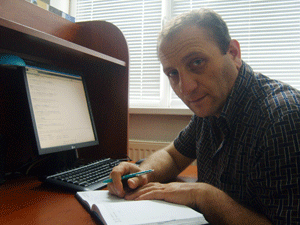Ana Sheshaberidze
 Zaza Kedelashvili, a wrestler from a Georgian judo team used foul language against journalist Irakli Tavadze and threatened, “you’d better think well what you are writing and about whom.”
Zaza Kedelashvili, a wrestler from a Georgian judo team used foul language against journalist Irakli Tavadze and threatened, “you’d better think well what you are writing and about whom.”
The facts of coercion on media outlets do not surprise anyone in Georgia. Both local and international organizations have highlighted the decrease of media freedom level in Georgia and the frequent facts of coercion on media outlets many times in their reports. However, the coercion was mostly related to various political or business interests. Sport media had been relatively free from coercion. However, sports journalists recently have also come to face this problem. Irakli Tavadze from sports newspaper Lelo is not the first from this newspaper who was coerced. Nikoloz Neparidze, another journalist of Lelo was insulted several months ago.
Kedelashvili threatened Irakli Tavadze because of his article with the title “Give Caesar Caesar’s” which was published in the August 13 issue of the newspaper. The journalist was criticizing Shota Khabareli, the coach of the male judo team in the article. The journalist considered that the coach included Kedelashvili and Kevkhishvili into the team due to their “old” merits.
“We were surprised for what merits were Kedelashvili and Kevkhishvili included into the team? We have nothing against their personalities but they have hardly practiced this year and we strongly doubt that they are in good shape. They have not practiced with the team most of the season and they often violated the team plan” – this is an extract from the article which made Kedelashvili angry. He called Tavadze, used foul language against him and told him, “I will come to Tbilisi and show you in what physical shape I am.”
“It is a very bad precedent when some people think that we, journalists and media outlets do not have the right to interfere in their sports affairs and they think that a sports federation and a team belong to them. Unfortunately, this comes from Georgian mentality and the sooner it changes the better,” says Irakli Tavadze.
This is not the first case of coercing Lelo journalists, as we mentioned before.
The same kind of incident occurred between Nikoloz Neparidze, a journalist of Lelo and Kakha Kaladze, the captain of the Georgian football team.
In the case of Kedelashvili, it was the journalistic article that made the sportsman angry while with Kakha Kaladze, he was furious about the translation of an article which was published in an Italian newspaper. An Italian journalist was giving a negative evaluation to Kakha Kaladze’s play. Neparidze translated the article and published it in Lelo which caused threat and insult of the journalist. “These kinds of facts are unacceptable. If a journalist is lying you can sue him or speak to him in a normal tone and not threaten or use foul language. It cannot continue like this. If we do not react, they (sportspersons) will dare more,” Neparidze told us.
This is how he explains the facts of coercions on Lelo journalists: “Apparently, we are critical and they do not like this. Truth is sometimes bitter.”
We asked Giorgi Gorgodze, editor-in-chief of magazine Dato Kipiani (Atiani), to comment on these facts. He gives a negative evaluation to the fact of coersion but considers journalists to be guilty up to a certain extent. “You will be treated as how you act,” says Gorgodze and adds “We, journalists are guilty as well. We have tolerated many things and often closed our eyes for the truth. I understand that it is very difficult to be critical to the people who have won in various tournaments and have gained people’s love but it is necessary. We (journalists) have spoilt them with our softness and now they react inappropriately to the slightest criticism.” He advises the dissatisfied sportsmen to be more loyal to critical publications; otherwise the popularity gained through their victories will disappear very soon.
Sportsmen should know that their popularity depends on a positive disposition of media towards them and if not journalists the society would not have known about their success and victory.
Zviad Koridze, a media expert, considers that coercion on journalists is unacceptable. “It is a criminal offence,” he says.
He thinks that the increased number of coercions is caused by feelings of impunity (among coercers) and absence of solidarity among journalists. He considers that this kind of cases should be discussed in court for it to cease from happening again.



